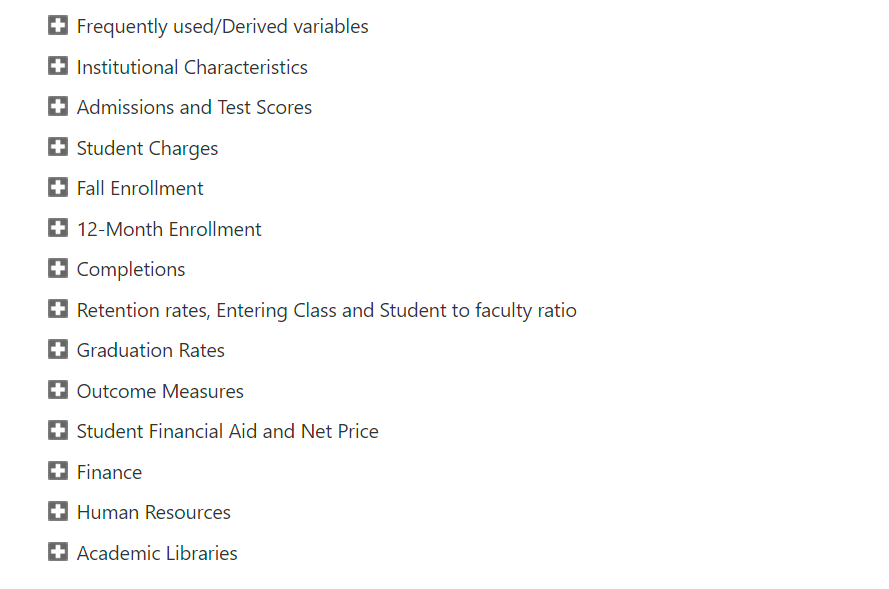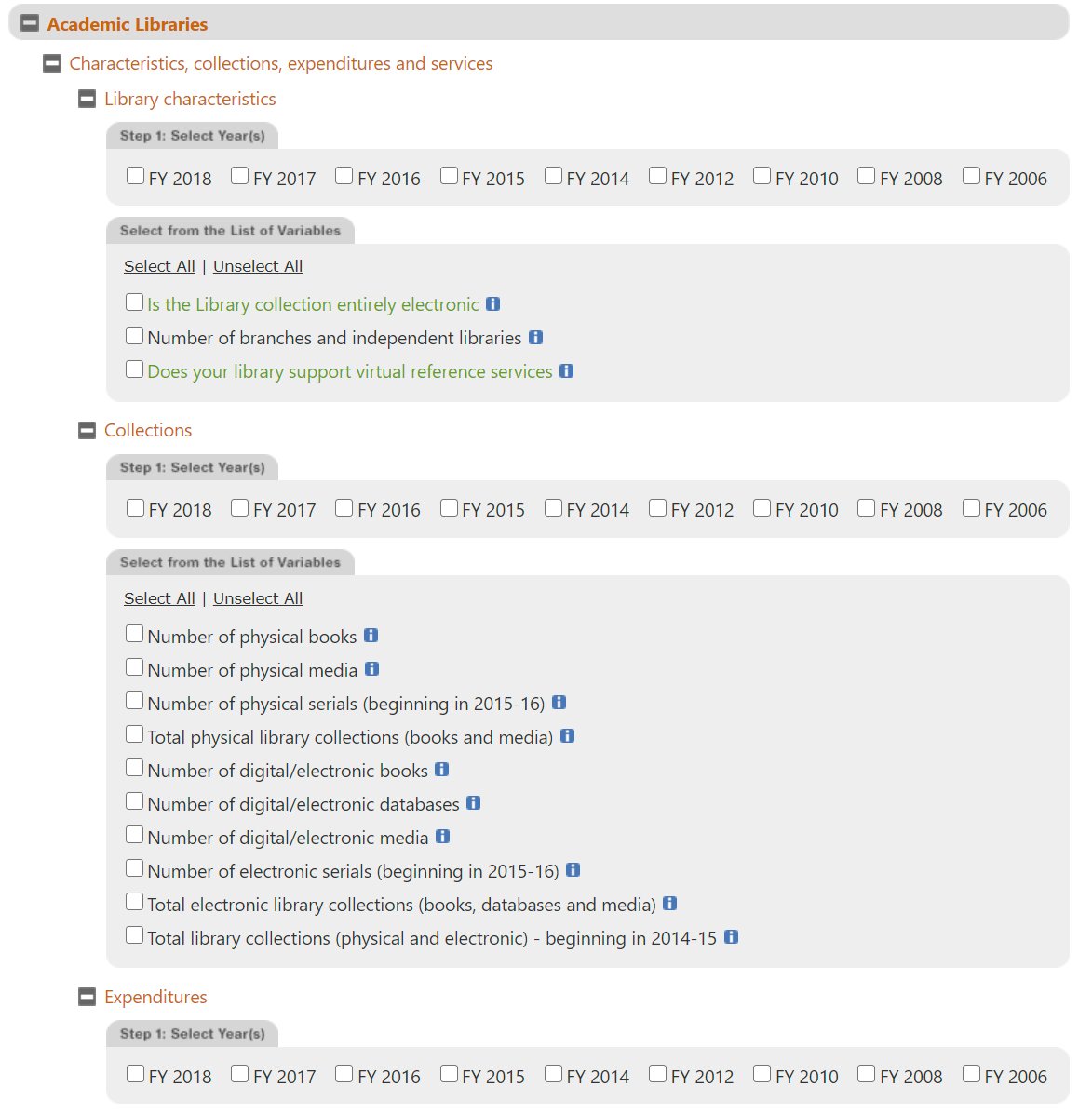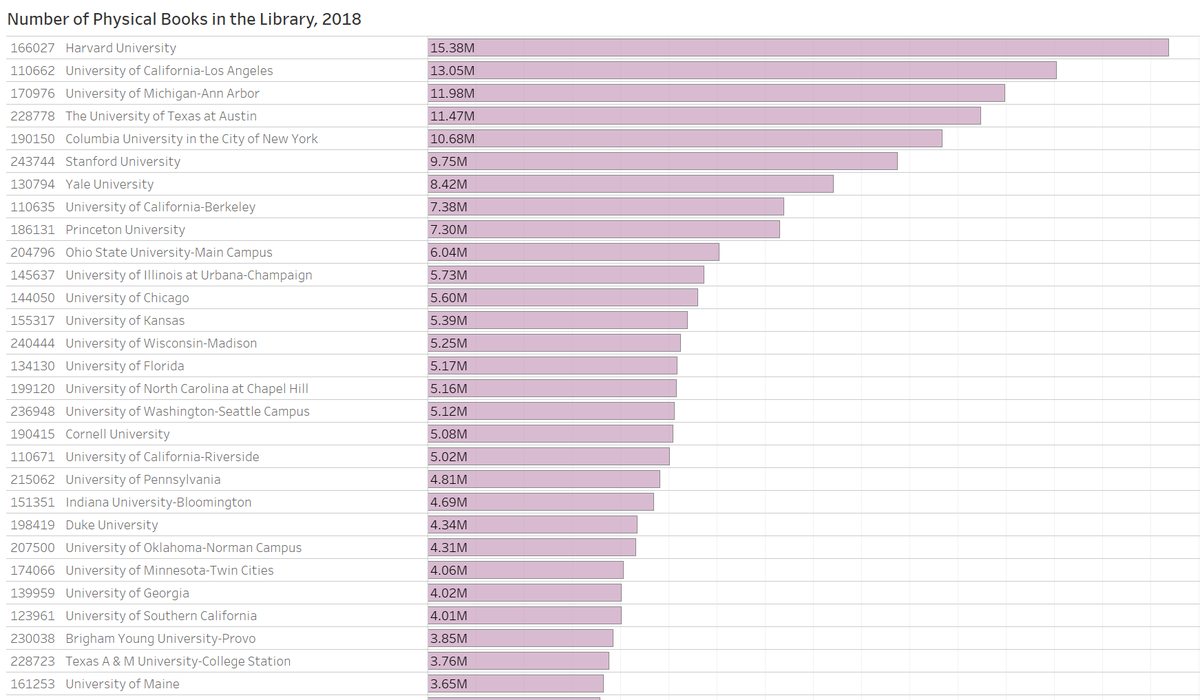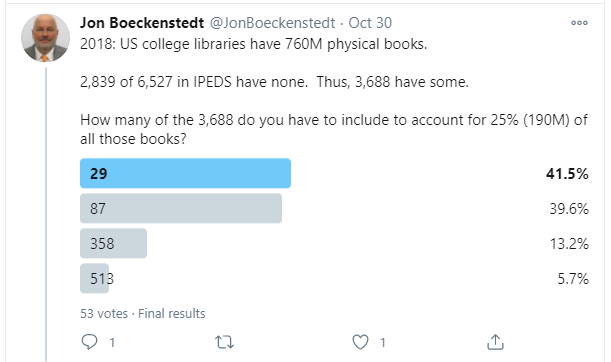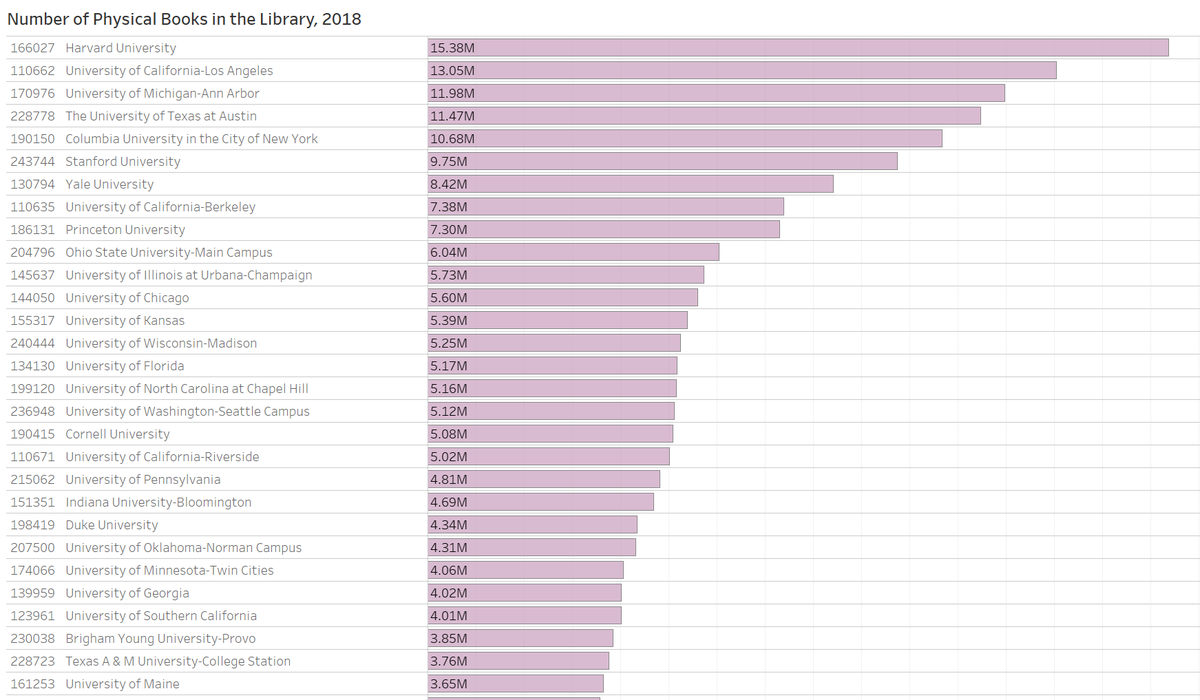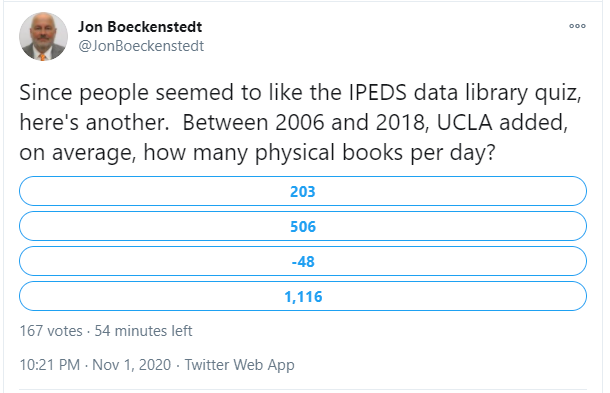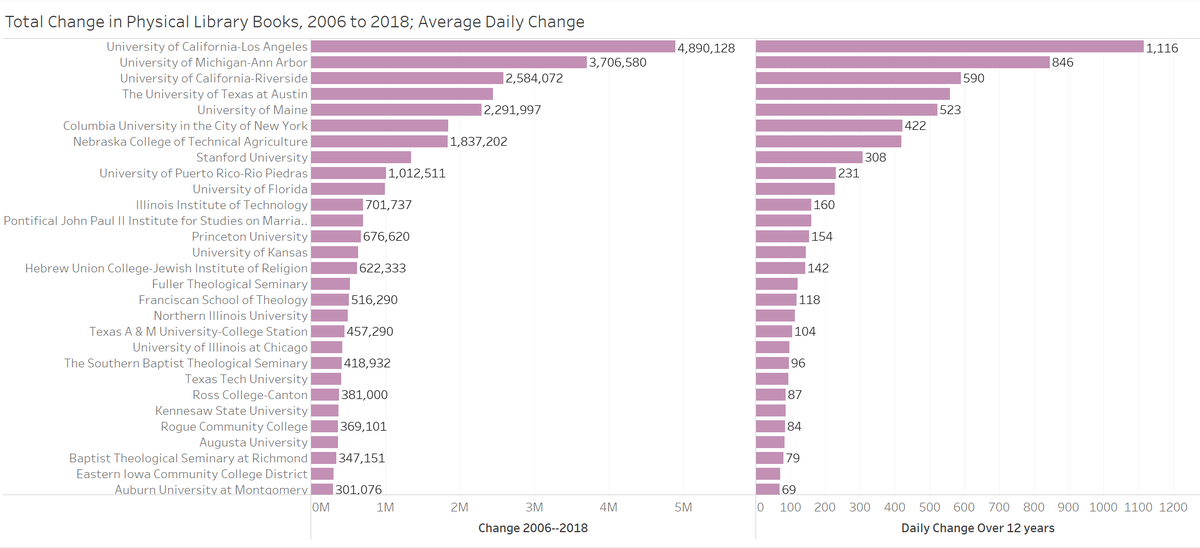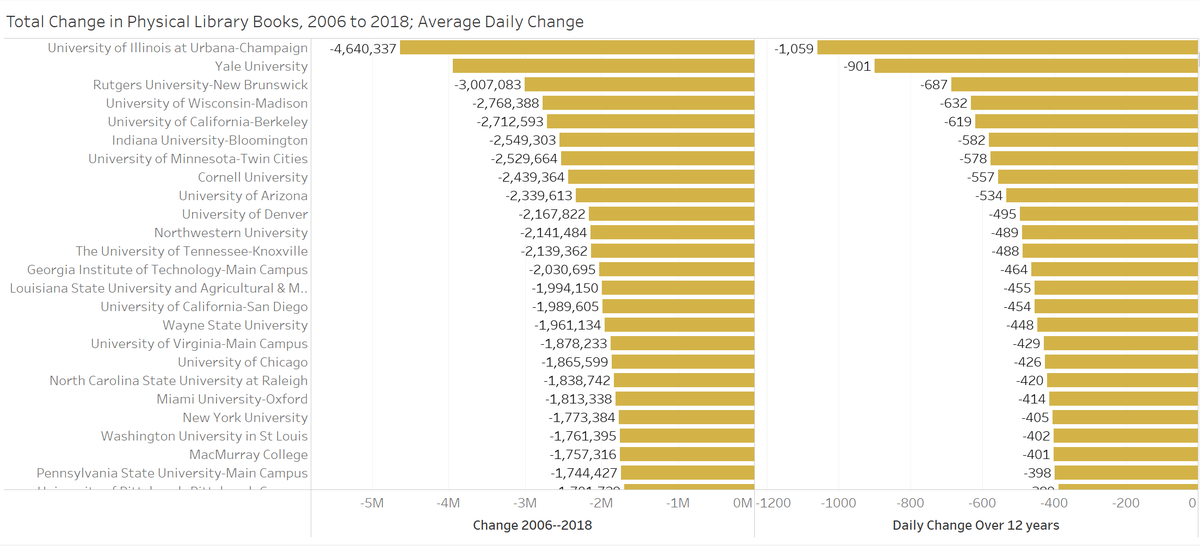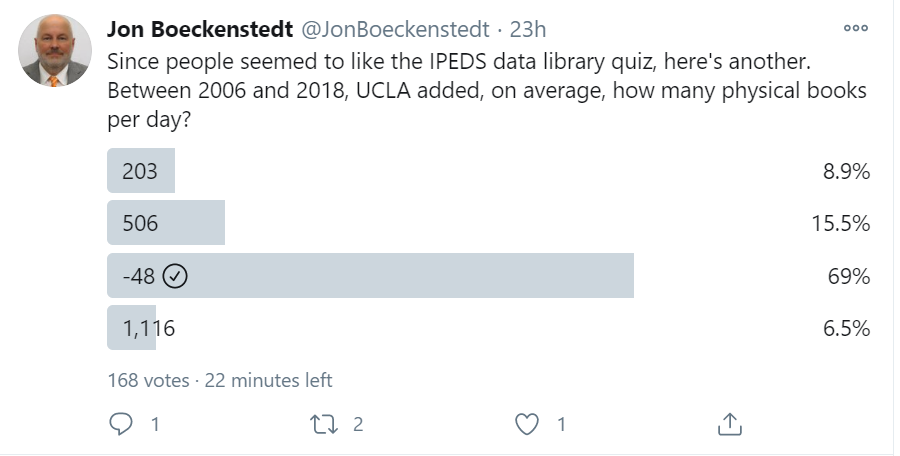Thread: Library books. And voting.
The other night, I went into IPEDS to see if I could find Fall, 2019 enrollment data. Not there. So I looked around just to see if there was anything new I didn't already have, or didn't have in the format I wanted.
The other night, I went into IPEDS to see if I could find Fall, 2019 enrollment data. Not there. So I looked around just to see if there was anything new I didn't already have, or didn't have in the format I wanted.
Nope. At least not anything I wanted to start visualizing at 10 pm. But I scrolled all the way down. Finance? Not tonight. HR? Meh. Libraries?
Libraries? I realized in all the years I've been doing this, I had never looked a library data. So I jumped in.
Libraries? I realized in all the years I've been doing this, I had never looked a library data. So I jumped in.
There is more there than you might think. So, looking for something quick, easy, and fun (but, I thought, kind of boring) I decided to dive into collections. And rather than restructure lots of data, just two points: 2006 and 2018, 12 years apart.
Before I begin, I'm going to admit I didn't dive down into definitions, but I'm presuming that a "physical book" meant the same thing in 2018 as it did in 2006; that you can count them in pretty much the same way. And that there is no USNWR book counting manipulation going on
On that last point especially, please don't disabuse me of this notion if I'm wrong. I'd like to think librarians are better than the rest of us.
I think we all would.
I think we all would.
Anyway, guess what? Harvard has the most books, duh: 15.4M physical books in 2018. None of the top 25 or so are surprising.
For my EM colleagues who ask me about this stuff, here's where your data curiosity comes in.
How many books at all the universities? 760M
How many colleges have no physical books? 2,839 out of 6,527
How many books at all the universities? 760M
How many colleges have no physical books? 2,839 out of 6,527
Of the 3,688 that do, how many own 25% of all those books?
Just 29. The wisdom of the crowds worked. Barely.
Just 29. The wisdom of the crowds worked. Barely.
These are those 29. Any surprises? The University of Maine jumped out at me, just in the top 25% group in 29th place with 3.65M books. The population of the whole state of Maine is 1.4M.
I was really surprised that 53 people voted on this poll. So, I tossed out another one after doing a few calculations.
In the 12 years between 2006 and 2018, how many books per day did UCLA add to its collection? With a little less than an hour to vote, there are 167 votes.
In the 12 years between 2006 and 2018, how many books per day did UCLA add to its collection? With a little less than an hour to vote, there are 167 votes.
This is where it gets really interesting to me, not because of the intrinsic topic of books, but from a discussion about the future. And about strategy.
Let's assume that the library has changed like all our jobs in higher ed have changed. How would that play out in books?
Let's assume that the library has changed like all our jobs in higher ed have changed. How would that play out in books?
One person (since blocked because this is Twitter and I'm under no obligation to listen), thought he had cracked the code.
But as you see, he was wrong about UCLA. UCLA added almost five million books in 12 years, or, on average, over 1,110 books *per day* including weekends and holidays.
I wonder if UCLA has people whose only job it is to unpack, catalog, and shelve books. And how many.
I wonder if UCLA has people whose only job it is to unpack, catalog, and shelve books. And how many.
So the question becomes: What was the strategic decision that drove that? Was it intended to catch up to other universities? Was it a bet on the long-term value of books vs. electronic titles? Did someone have a 10% off coupon at Amazon? The average, BTW was +42 books per day.
And the even more interesting thing (but maybe that's just me) is the opposite end of the discussion: Has anyone dropped the number of physical books?
The answer is yes. Bigly.
The answer is yes. Bigly.
The University of Illinois at Urbana-Champaign has gone in the exact opposite direction. It has dropped 4.6M volumes, shedding almost 1,100 per day. And there are lots more like them, including Berkeley, in the same system as UCLA. These 33 schools have dropped 271M books.
Look at little MacMurray College. It owned 1.8M volumes in 2006, and was down to about 62,000 by 2018.
It announced it was closing last spring.
I'm not an expert on libraries or library strategy. So maybe I'm missing something really big here. If so, Twitter will let me know
It announced it was closing last spring.
I'm not an expert on libraries or library strategy. So maybe I'm missing something really big here. If so, Twitter will let me know
Perhaps it was a digital strategy. Maybe a new, smaller library was built for a modern era, and the purge was necessary. Or a new big one was built and there were shelves to fill, damn the torpedoes.
Maybe places had to raise cash. Or maybe some of those books hadn't been opened in years, and it was time for them to move on.
But for me this was a great exercise is exploring new data; I've learned my lesson about pre-judging how interesting it will be.
But for me this was a great exercise is exploring new data; I've learned my lesson about pre-judging how interesting it will be.
And for my colleagues in IR and EM, I hope it shows why a static report should generate many more questions than it answers. And why you should equip yourselves and your audiences to answer them.
With just 22 minutes left, I'm calling this election, and the wisdom of the crowd failed. Catastrophically.
Your late votes will be counted, but they will not change the outcome.
Your late votes will be counted, but they will not change the outcome.
Library acquisitions might show the biggest difference in directional strategy of any variable in IPEDS.
Think about that. One thing we don't all agree on.
Someone should write a book about it. UCLA will buy it, I bet.
Think about that. One thing we don't all agree on.
Someone should write a book about it. UCLA will buy it, I bet.
That's all for tonight.
Let's hope the crowd gets it right tomorrow (or today, if you're in the eastern or central time zones.)
Let's hope the crowd gets it right tomorrow (or today, if you're in the eastern or central time zones.)
Oh, and #EMTalk

 Read on Twitter
Read on Twitter